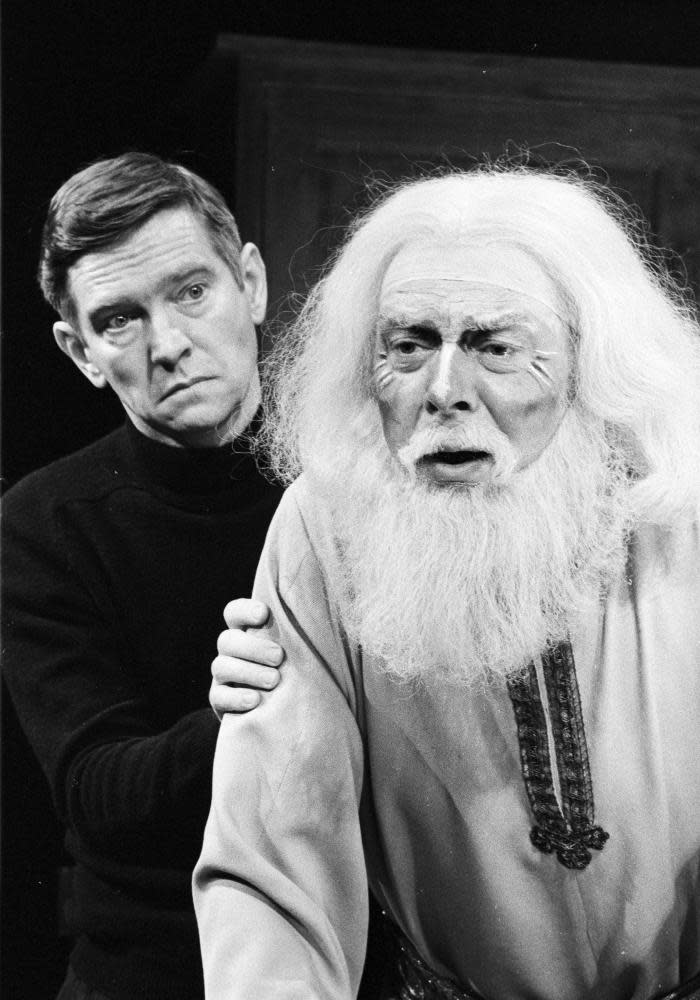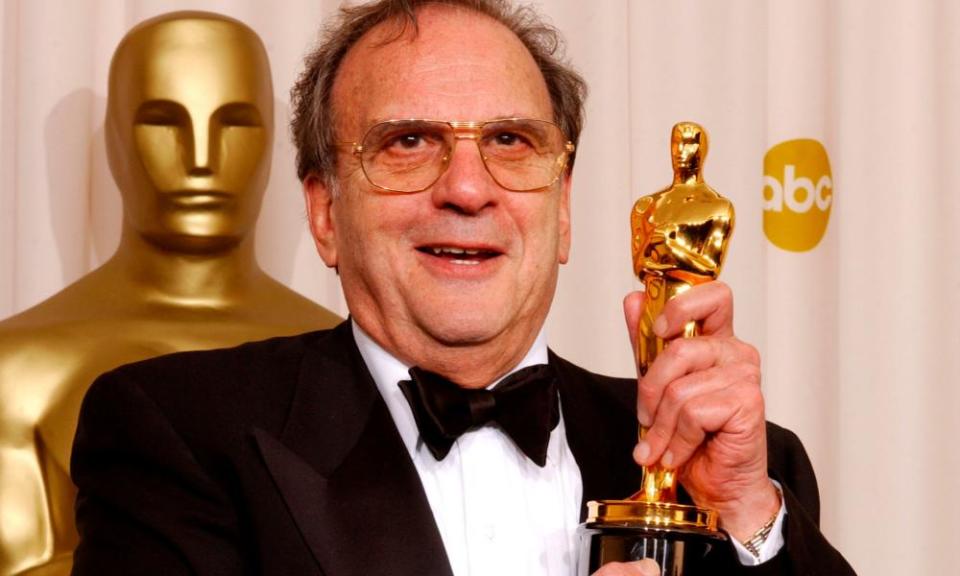Sir Ronald Harwood obituary

Ronald Harwood, who has died aged 85, was an indefatigably hard-working playwright, novelist and screenwriter, who won an Oscar for best screenplay for The Pianist (2002), his adaptation of Władysław Szpilman’s book about surviving the Warsaw ghetto.
He first made a serious impression with his best-known play, The Dresser (1980), which drew on his experience of working with the actor-manager Donald Wolfit in the 1950s. It was the turning point in his professional fortunes, charting the uneasy relationship between a big star and his essential amanuensis that was in itself a dramatisation of a biographer’s role. The premiere at the Royal Exchange in Manchester in March 1980 was a climactic moment in the history of a new venue that, as a sort of “national theatre of the north”, challenged the southern hegemony of the RSC and the National on the South Bank under Peter Hall. It transferred to the Queen’s theatre in London.

Ironically, Hall directed a West End revival of The Dresser in 2005. The performances of Julian Glover as “Sir” and Nicholas Lyndhurst as Norman, the effete dresser, were admirable, but in no way eclipsed the memory of a tumultuous Freddie Jones in the original (a role taken over in the 1983 film by Albert Finney) and Tom Courtenay, who seemed to have perfected a way of leaning backwards while simultaneously walking forwards.
A fine BBC television production 10 years later by Richard Eyre starred Anthony Hopkins and Ian McKellen, followed in 2016 by a West End stage revival with Ken Stott and Reece Shearsmith. The play continues to be performed, by professionals and amateurs, all over the world.
As a South African Jew who came to Britain in 1951 to work in the theatre, Harwood scrupulously used every aspect of his background in his work, which ranged from wryly observed domestic scenarios to studies of musicians – the composer Gustav Mahler, the conductor Wilhelm Furtwängler – whose careers were compromised by political expediency.
He was a compassionate writer whose ingrained decency and moral integrity also governed his public behaviour. He was active in the British branch of PEN before becoming president of the international section from 1993 to 1997. And he was a ferociously committed smoker, cancelling a trip to Winnipeg to direct his famous play in 2004 because of “Canada’s draconian anti-smoking laws”.
Cheerful and ebullient, at least on the outside, Harwood was a stalwart member of the Garrick club and had long learned to live with the fact that he was not as critically admired as his fellow cricket-loving friends (he was a member of the MCC) Harold Pinter, Simon Gray and Tom Stoppard. I once asked his son, the agent and publisher Antony Harwood, how he coped with bad reviews. I was told that he simply got up the next morning and started on a new project. He was severely jolted, though, by the critical mauling of Mahler’s Conversion in 2001, starring his cousin and fellow South African Antony Sher.
The Dresser was based on his 1971 biography of Wolfit, subtitled “His Life and Work in the Unfashionable Theatre” and Harwood was happy to think of himself as “old school”, devoted to leading actors of personality and fortunate in the loyalty of artists he admired, such as Dorothy Tutin (who appeared in After the Lions, his play about the gorgonesque Sarah Bernhardt in 1982; “an embarrassment from start to finish” I’m afraid I said at the time), Paul Scofield (who led a distinguished cast in his tea and antipathy play, A Family, in 1978), Courtenay and Finney.
Finney became particularly associated with his work in a series of superb West End performances: his recovering hostage ex-priest in JJ Farr (1987, opposite Bob Peck); a bankrupt Jewish commercial traveller – and his own son, 35 years later – in the almost painfully autobiographical saga of exodus and return Another Time (1989); and as an incensed Manchester restaurateur in Reflected Glory (1992).
Harwood was born Ronald Horwitz, in Cape Town, South Africa, the youngest son of Isaac Horwitz, a Lithuanian refugee, and his wife, Isobel (nee Pepper), a cultured and powerful personality. His father, who figured in many of his plays and novels, was a commercial traveller and had suffered a nervous breakdown, later becoming a semi-invalid.
Ronald was educated at Sea Point boys’ high school in Cape Town. A childhood love of the theatre – he wanted to be an actor from the age of six or seven, fired by the film performances of Laurence Olivier in Hamlet and Henry V – led him to study at Rada in London.
In 1959, after working with Wolfit as a small-part actor, dresser and business manager, he married Natasha Riehle, who was then an assistant stage manager, and his father-in-law gave him a typewriter as a birthday present. The die was cast. “It wasn’t until I began writing that I began to make a living.”

He published his first novel, All the Same Shadows, in 1961 and wrote two television plays for the BBC, one of which, Private Potter, starred the young Courtenay, who would play the saint-like lead in One Day in the Life of Ivan Denisovich (1970), Harwood’s screen adaptation of Alexander Solzhenitsyn’s diary in Stalin’s gulag. His screenwriting debut had come with an adaptation of Richard Hughes’s A High Wind in Jamaica in 1965, directed by Alexander MacKendrick, who, said Harwood, taught him everything he knew about writing for the cinema.
His reputation as one of the best adapters in the business was confirmed with his theatrical version of Evelyn Waugh’s The Ordeal of Gilbert Pinfold for the Royal Exchange in 1977, which gave Michael Hordern one of the outstanding roles of his career.
On TV, he scored a memorable success with The Deliberate Death of a Polish Priest (1986), directed by Kevin Billington, and his high-class film career continued with Finney playing Andrew Crocker-Harris in his new look at Terence Rattigan’s The Browning Version (1994), directed by Mike Figgis, and James Earl Jones and Richard Harris leading the charge in another return to South Africa, Cry, the Beloved Country (1995).
After his Oscar triumph,Harwood produced a delightful screen version of Somerset Maugham’s story of love and revenge among actors in the West End of the 1930s, Being Julia (2004), directed by István Szabó – who also directed a riveting film version of the Furtwängler play, Taking Sides, in 2001.
A 1999 stage play, Quartet, about life in a retirement home for elderly musicians, became a much better 2012 film directed by Dustin Hoffman, with beautiful performances by Pauline Collins, especially, Maggie Smith, Courtenay and a relentlessly jovial Billy Connolly. Two screenplays of 2007 – for Mike Newell’s Love in the Time of Cholera, adapted from Gabriel García Márquez’s great novel, and for Julian Schnabel’s The Diving Bell and the Butterfly, based on Jean-Dominique Bauby’s account of living with locked-in syndrome after a stroke – won plaudits and awards throughout Europe.

One of his last plays in the West End was a fleet and funny British version of the French boulevard comedy, Le Dîner de Cons, cheekily and acronymically retitled See You Next Tuesday (2003), but this was jobbing work. In 1985, Interpreters starred Smith and Edward Fox as old lovers rekindling a flame at a summit conference. It was not a theatrical bonfire. One night during the run Harwood made the mistake of putting his head round Smith’s door. “Hello Ronnie,” she enquired coldly, “and what are you up to now?” “Struggling with a new play, darling,” Harwood replied. “Aren’t we all?” came the devastating riposte.
Harwood was elected a fellow of the Royal Society of Literature in 1974, appointed a CBE in 1999 and knighted in 2010. Natasha died in 2013. He is survived by their children, Antony, Alexandra and Deborah.
He made the interesting claim that writing was for him a form of creative self-analysis: “If I told people my problems and struggles, what would I have left to write about? You need the pressure on you internally.”
• Ronald Harwood (Horwitz), playwright and screenwriter, born 9 November 1934; died 8 September 2020


